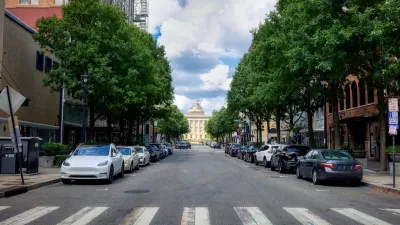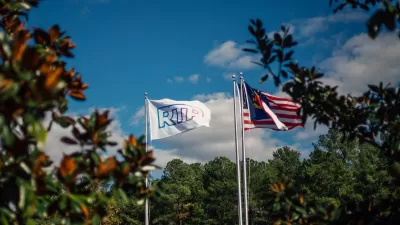The North Carolina capital is reinventing itself as a research and tech hub, attracting major employers and investment along the way.

Writing for the Commercial Observer, Celia Young reports on Raleigh, North Carolina’s explosive growth. “With high-rises sprouting throughout Raleigh’s downtown and Warehouse District, startup hubs and lab conversions transforming neighboring Durham’s former tobacco warehouses, and a burgeoning life sciences sector becoming a bigger national player amid a race for lab space, the Triangle is a ‘supernova,’ according to the latest Urban Land Institute (ULI) Emerging Trends report.”
According to Young, “The region has attracted 44,000 new jobs since the pandemic, just behind Austin and Nashville, with Wake County, where Raleigh’s located, welcoming just over 62 people a day last year.” As Young writes, “While it’s not surprising for a midsize metro in the Southeast and Sun Belt to take strides in today’s commercial real estate market, Raleigh-Durham tops peers with high educational attainment and high income in relation to housing and office costs.”
Young traces the history of Raleigh’s development as a research and tech hub. “Raleigh’s development boom, like so many things in the region, can trace part of its success back to the formation of Research Triangle Park (RTP) in 1959. A collaboration between the region’s academic powerhouses — Duke University in Durham, State University in Raleigh, and the University of North Carolina in Chapel Hill — the 7,000-acre site became a magnet for tech.”
Young points to the city’s willingness to change its zoning code as one component of its rapid growth. “Combined with the city’s Unified Development Ordinance, which consolidates zoning and other planning regulations, Raleigh’s growth policies make it relatively easy to build, and build fast, especially compared to more established markets.” Similar growth is happening in other parts of the state, which is making a concerted push to woo major companies.
FULL STORY: Raleigh Development Boom Rides Life Sciences, Tech Interest

Alabama: Trump Terminates Settlements for Black Communities Harmed By Raw Sewage
Trump deemed the landmark civil rights agreement “illegal DEI and environmental justice policy.”

Planetizen Federal Action Tracker
A weekly monitor of how Trump’s orders and actions are impacting planners and planning in America.

How Atlanta Built 7,000 Housing Units in 3 Years
The city’s comprehensive, neighborhood-focused housing strategy focuses on identifying properties and land that can be repurposed for housing and encouraging development in underserved neighborhoods.

In Both Crashes and Crime, Public Transportation is Far Safer than Driving
Contrary to popular assumptions, public transportation has far lower crash and crime rates than automobile travel. For safer communities, improve and encourage transit travel.

Report: Zoning Reforms Should Complement Nashville’s Ambitious Transit Plan
Without reform, restrictive zoning codes will limit the impact of the city’s planned transit expansion and could exclude some of the residents who depend on transit the most.

Judge Orders Release of Frozen IRA, IIJA Funding
The decision is a victory for environmental groups who charged that freezing funds for critical infrastructure and disaster response programs caused “real and irreparable harm” to communities.
Urban Design for Planners 1: Software Tools
This six-course series explores essential urban design concepts using open source software and equips planners with the tools they need to participate fully in the urban design process.
Planning for Universal Design
Learn the tools for implementing Universal Design in planning regulations.
Caltrans
Smith Gee Studio
Institute for Housing and Urban Development Studies (IHS)
City of Grandview
Harvard GSD Executive Education
Toledo-Lucas County Plan Commissions
Salt Lake City
NYU Wagner Graduate School of Public Service





























